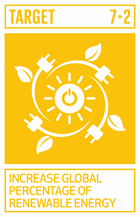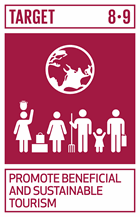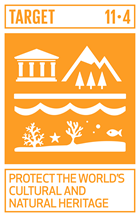Concept for the Eco Mobile Bike Station
CSNPA can confirm that in order to be a sustainable touristic destination one of the main challenges is a lack of quality sustainable infrastructure in the Curonian Spit. There is a 50 kilometers long bike route along the whole Curonian Spit, but it is not very well developed.
It was decided that the best ecological way to improve bicycle tourism in the World Heritage site was to develop a multifunctional service station powered by green energy.
Eco-friendly solutions create modern and smart infrastructure for cycling paths, because any user can inflate the tyres with the air compressor installed in a station as well as fix the bicycle with the tools provided in the same service station.
It enables charging of a smartphone or other devices for free while being connected to Wi-Fi and provides information about the area where the product is located.
The Problem/Challenge
This concept will help to solve the problem of lack of eco-friendly infrastructure, for example availability of bicycles repair and wi-fi services for visitors, and meet WHS management communication needs.
The main kind of ecological transport is bicycles. There is a 50 kilometers length bike route along the whole Curonian Spit (this route is known as Eurovelo 10 route on the international level). With few exceptions the route goes through the natural areas with no infrastructure.
For bicycle travellers it is very important along the way to have the possibility to repair the bicycle, to get internet access (especially for foreigner travellers). One of the main bicycle tourist stops is a self-guided trail in Nagliai strict nature reserve where there is no electricity and often problems with the mobile network connection.
To meet WHS management communication needs – the bicycle trail stop in Nagliai strict nature reserve is a very important place for representation of the Curonian Spit cultural landscape.
The bike station should not cause visual landscape pollution, and should represent eco-friendly management. On the station there is information about the DUNC project and the Baltic Sea WHS network with internet links to WHS. At the same time the station helps to collect visitors data, that can help to improve visitors experiences on the site - for instance number of visitors or interests based on browsing requests.
Development Process
This concept was represented in the meeting of Lithuanian protected areas staff on August, 2018, when the administration of Curonian Spit National park organized a bike tour through the Curonian Spit.
During the event participants discussed the possibilities to improve activities related to cycling in the Curonian Spit, staff from other protected areas administrations were invited to exchange their best practice and experiences with regard to seasonal challenges and bicycle products.
The main conclusion was that the best way to improve the bike route was a new high quality eco-friendly infrastructure. Because project resources were limited, participants agreed that a mobile bike station can bring the biggest mutual benefit. Afterwards the people who cycle the most in the area and have their own bike rentals discussed what kind of product it could be and how it could be relevant for them.
Stakeholders
Local stakeholders were invited to discuss their needs for a mobile bike stop. Information letters were sent to the main region information centers (in Nida and Klaipeda) and bike stakeholders (Velonida, Dviratis Jums, Baltic Bike Travel, Eminida), sports activities stakeholders (Irklakojis) and an excursion agency for cruise ships (Meja Travel). The majority of stakeholders agreed with CSNPA's suggested area – Nagliai strict nature reserve.
Stakeholders confirm that such a product is definitely necessary in the areas where power supply is limited but the services are much needed. They confirmed that it is great place to reach their customers as well, because there is a big parking area. Some of the stakeholders suggested urbanized territories such as Juodkrante’s, Pervalka’s settlements centers. But CSNPA prefer that the municipality administration is responsible for the urbanized territories.
The Product
In order to improve the quality in WHS and to become a a more sustainable area it is necessary to introduce new possibilities and to tackle the challenges while using a novel approach. A multifunctional service station powered by solar energy could be a unique product that can solve the difficulties which the Curonian Spit National Park is facing.
Complex eco-friendly solutions creates a modern and smart infrastructure for public spaces, including cycling paths. Any user can inflate the tyres with the air compressor installed in a station as well as fix the bicycle with the tools provided. It also enables charging a smartphone or other devices for free while being connected to Wi-Fi.
Furthermore, information about the area where the product is based can also be accessible on the stand installed on this device. During the consultation with the PA staff, bicycle rental service providers and others, it was decided that this station must have:
- WIFI - internet
- Air compressor
- Bike service
- Video surveillance camera
- Charging system
Sustainability
The mobile bike stop facilitates visitors' outdoor cycling experiences in the CSNPA. There is no need for any kind of engineering or infrastructural changes in the natural areas, because this device uses renewable energy as a power source, and therefore contributes to reducing the challenges of global warming.
This multifunctional device is an important attribute for the creation of a better public health as it encourages cross-generational cooperation and covers safety issues for the young and for the old, for the healthy and for the ones with disabilities. It also creates an opportunity to gather data (for instance number of visitors, interests based on browsing requests, most used services, occurring needs, etc.) which later can be used for tourism attraction and improvement of the area.
Piloting
The multifunctional public station has been tested in multiple places in Nida city center and it was an extremely popular place to get wi-fi or to charge the telephone.
Evaluation
The mobile bike stop station was a very popular place for tourists. The users of such a device constantly give positive feedback and confirm that such a product is definitely necessary in the areas where power supply is limited but the services are much needed.
Costs
The costs depend on what kind of functionality is needed in a concrete mobile station. As we analyzed our needs during the workshops the main mobile station should cost 10 000 Euros and layout design 200 Euros.
Lessons Learned
Everything went smoothly, one of the main aspects to do it better – have more official meetings with local stakeholders to discuss challenges in the Curonian Spit.
Relevance to Other Sites
Other WHS also have bike routes, for instance the agricultural landscape of Southern Öland has a similar situation with no power access for the visitors. Therefore, we think it could be a good opportunity to implement a similar idea there as well. On the other hand, maybe other WHS could implement another bike oriented product.
The Eco Mobile Bike Station and the Global Goals
The Eco Mobile Bicycle Station has contributed to the Global Goals targets 7.2 Increase Global Percentage of Renewable Energy, 8.9 Promote Beneficial and Sustainable Tourism and 11.4 Protect the World’s Cultural and Natural Heritage.


